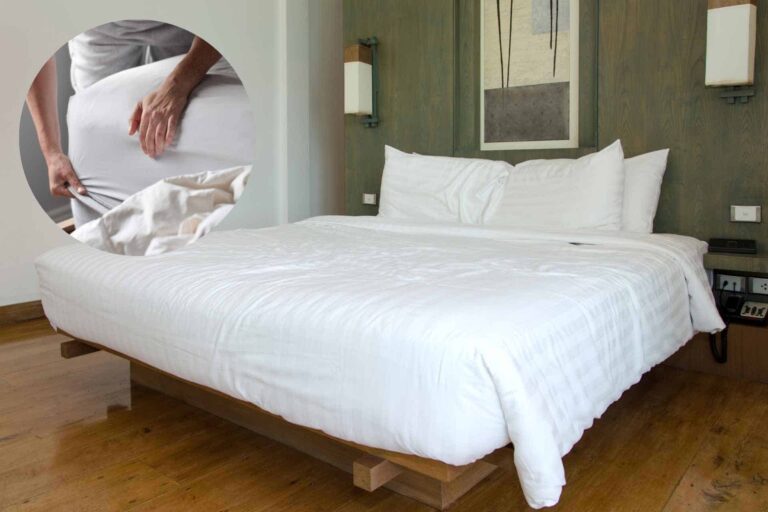Mirror Facing Bed Spiritual Meaning: Myth, Superstition, or Reality?
The placement of mirrors in a bedroom, especially facing the bed, is an interesting topic steeped in cultural beliefs, superstitions, and spiritual significance. This seemingly ordinary act of interior design can evoke a variety of responses, largely due to the diverse interpretations across different cultures. Mirrors have always held a certain mystique throughout history, not just as reflective surfaces, but also as portals to other realms or as tools of divination in some beliefs. When a mirror is placed facing a bed, it may simply serve the practical need of providing a reflected image. However, from a spiritual or superstitious standpoint, it might be seen as an act that could impact the room’s energy flow or even influence the sleeping mind. This article aims to delve into the myriad of interpretations, myths, and realities associated with the so-called “mirror facing bed spiritual meaning,” from the lens of various cultural beliefs to the scientific perspective.
The Spiritual Significance of Mirrors
Mirrors hold a captivating place in the realm of spirituality, functioning as more than mere reflective surfaces. They are often seen as symbols of truth and honesty, reflecting back our authentic selves. In various religious and spiritual traditions, mirrors embody the idea of self-awareness, urging individuals to look past their physical exterior and delve into their internal selves. Many cultures and spiritual practices also use mirrors in rituals and ceremonies, viewing them as portals to alternate dimensions or supernatural realms. In the spiritual context, a mirror is not just an object that reflects physical reality, but it also symbolizes the inner realm of consciousness and the unseen truths of the universe. This profound spiritual significance extends to the placement of mirrors in our homes and, specifically, the bedroom. The act of placing a mirror facing the bed, thus, carries a deeper resonance, intertwining the practical, the spiritual, and the symbolic.
You may also like:
The Mirror in Different Cultures

Mirrors have been woven into the fabric of many cultures, each attributing to them unique meanings and purposes. In Chinese Feng Shui, a mirror facing the bed is considered inauspicious as it is believed to invite harmful spirits and disrupt the harmony of the room. Conversely, in Mexican culture, mirrors are seen as protective entities; a mirror facing the bed is thought to reflect and deflect negative energy. Furthermore, in Indian Vastu Shastra, mirrors should not be placed in bedrooms at all, to prevent the draining of positive energy.
In the Western world, mirrors have served dual roles, associated both with vanity and truth. This dichotomy is reflected in the Greek myth of Narcissus, whose self-obsession led to his downfall, and in fairy tales like “Snow White,” where the mirror represents a conduit of truth. Jewish tradition, in contrast, covers mirrors in the house during the mourning period, reflecting a focus away from vanity towards inner reflection.
Thus, the mirror, an everyday object, embodies a wealth of cultural meanings and superstitions, influencing its placement in our homes, particularly in relation to the bed.
Mirror Facing Bed Spiritual Meaning” in Various Beliefs

In various spiritual beliefs, the position of a mirror facing the bed holds profound implications. In the mystical traditions of Kabbalah, mirrors are seen as portals to other dimensions, and thus, having one face the bed might enable spiritual entities to enter the room, affecting dreams and energy levels. In Japanese culture, akin to Feng Shui, a mirror facing the bed is deemed unlucky, and believed to disturb the spirit, whereas, in Celtic traditions, it is thought to encourage communication with the spirit world.
In some New Age philosophies, a mirror facing the bed can promote self-awareness and introspection, as it forces the sleeper to confront their own image first thing in the morning and last thing at night. However, for others, this could lead to self-obsession, echoing the cautionary tale of Narcissus. Some Neo-Pagan beliefs suggest that a mirror facing the bed can aid in astral projection, as it reflects the astral body leaving the physical one.
In contrast, in Islamic tradition, it is advised not to place mirrors facing the bed, as they are considered to attract unseen entities. Similarly, Christian beliefs often associate mirrors with vanity and discourage their placement facing the bed to support humility. Hence, the spiritual significance of a mirror facing the bed varies immensely across different cultures and beliefs, reflecting a fascinating blend of superstition, tradition, and spirituality.
Mirror Facing Bed Myths and Superstitions
Surrounding the placement of a mirror facing the bed, a myriad of myths and superstitions have emerged. An age-old European superstition suggests that a mirror reflecting your image while you sleep might steal your soul. In some Asian cultures, it is feared that the mirror will not only capture the soul but also trap it within the mirror’s reflective surface, creating an eerie doppelganger in the mirror world.
In contrast, certain African tribes uphold the belief that facing a mirror toward the bed wards off evil spirits, creating a protective barrier for the sleeper. The mirror’s reflective surface is believed to bounce off the negative energy, keeping the occupant safe.
In the realm of paranormal lore, mirrors are often linked to ghostly activities. Some paranormal enthusiasts argue that a mirror facing the bed can serve as a gateway for ghosts or spirits, leading to strange occurrences or unsettling dreams.
While these beliefs may not be scientifically substantiated, they highlight the powerful role of cultural superstitions and myths in shaping our understanding and interaction with everyday objects like mirrors. Whether stemming from religious, spiritual, or cultural origins, these myths add a layer of intrigue and mystery to the humble mirror’s placement in relation to the bed.
Energy Flow and Feng Shui
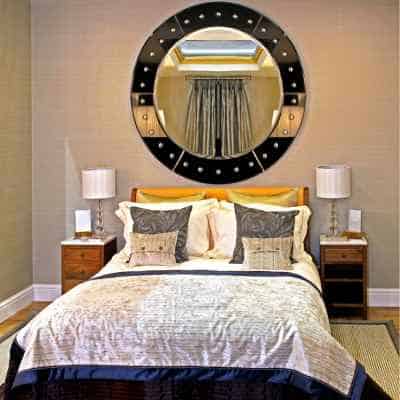
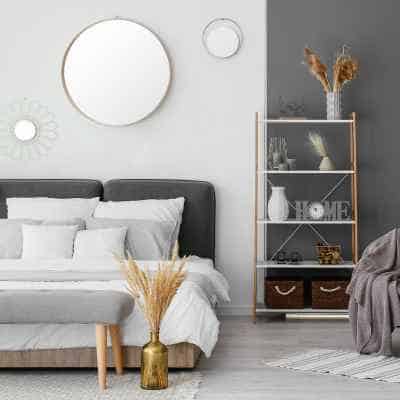
In the ancient Chinese philosophical system of Feng Shui, the placement of a mirror facing the bed is viewed with caution. This philosophy places a high value on energy flow, known as “qi” (chi), in living spaces to bring about harmony and balance in one’s life.
Feng Shui principles posit that mirrors have a powerful ability to redirect and amplify the flow of qi within a room. Mirrors are considered to double what they reflect, bringing in the energy of whatever lies within their field of view. When a mirror faces a bed, it is believed to reflect and amplify the energy of the person sleeping, which can lead to restlessness and disturbed sleep.
Moreover, Feng Shui considers the bedroom as a private sanctuary, a place for relaxation and rejuvenation. A mirror facing the bed is thought to invade this privacy, as it extends the energy of the room, making it feel larger and more active than it should be.
However, this doesn’t necessarily mean that mirrors should be banned from bedrooms. Feng Shui also provides solutions to counteract the potential negative influence. For instance, covering the mirror at night or positioning it in a way that it doesn’t directly face the bed can neutralize the amplified energy. By understanding and applying these principles, one can harness the power of qi to bring balance and harmony to their living spaces.
Reflections and the Sleeping Mind
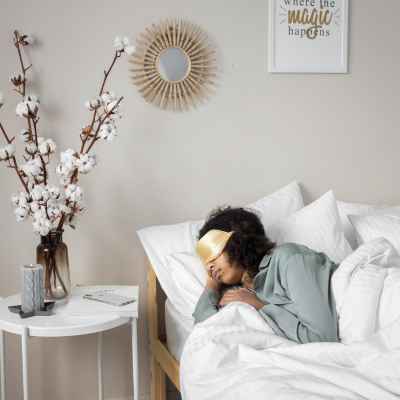
The sleeping mind, a quiet sanctuary of dreams, thoughts, and healing, can become a turbulent seascape with the incorrect placement of a mirror, according to Feng Shui principles. This hub of mental activity is highly sensitive to the type of energy inundating it, directly influencing the quality of sleep and, consequently, our overall well-being.
Mirrors, by their inherent property, reflect and multiply the energy of a space, which can potentially interfere with the tranquility of the sleeping mind. The mirror facing the bed, symbolically, opens a gateway, allowing external energy to intrude into the intimate sphere of the unconscious mind. This energy invasion can trigger vivid dreams, restlessness, and insomnia, disrupting the natural sleep cycle and potentially leading to various health issues.
The calming influence of sleep is undeniably essential for our physical and mental health. Understanding the Feng Shui principles associated with mirror placement can offer insight into creating a sleep-friendly environment. By managing reflections, we can harness positive energy, promote peaceful, restful sleep, and ensure that our minds wake up rejuvenated and ready for the day ahead.
Scientific Perspectives on Mirrors Facing Beds
From a scientific perspective, the belief in Feng Shui principles, including the placement of mirrors, can be linked to psychology and neuroscience. For instance, some studies suggest that our perception of our surroundings significantly influences our mental and emotional state.
When a mirror faces a bed, it can create an illusion of space and movement, possibly heightening sensory stimulation when we are most vulnerable to external influences – during sleep. This amplified sensory input can lead to restlessness or sleep disturbances, especially for those with heightened sensory sensitivities or certain neurological conditions.
Moreover, in darkness, mirrors can subtly alter our perception of reality, potentially leading to feelings of unease or anxiety. Various cognitive processes, including imagination and memory retrieval, can transform these vague reflections into apparitions, exacerbating sleep issues.
While there is no scientific evidence to directly support the Feng Shui principles of mirror placement, the psychological and neurological implications of environmental stimuli on sleep quality offer a plausible explanation for the associated beliefs. More research is needed to fully understand these potential connections and their implications for sleep health.
Reality Check: Interpreting the “Mirror Facing Bed” Spiritual Meaning
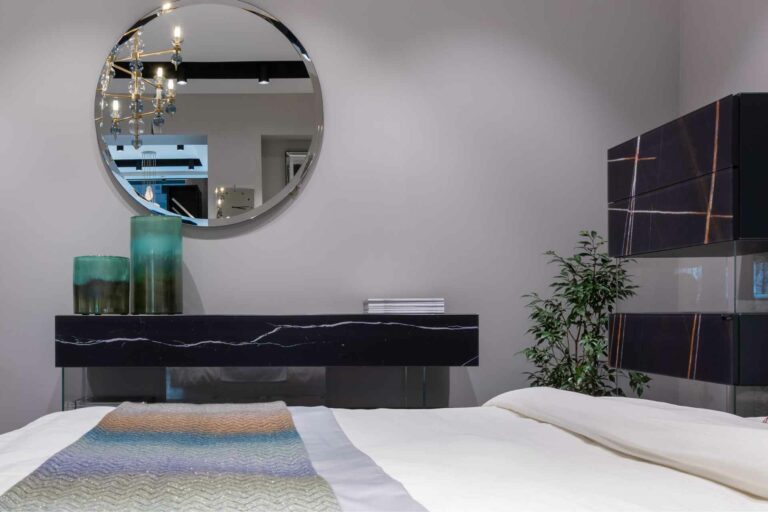
The spiritual interpretation of a mirror facing the bed extends beyond the boundaries of science. It roots itself in the ancient wisdom of Feng Shui, where mirrors are seen as carriers of energy, reflecting both the positive and negative. Their placement, therefore, is believed to influence one’s life force or ‘Chi’.
In spiritual terms, a mirror facing the bed is thought to invite external forces into the most intimate space – the bedroom. The concept alludes to the possibility of attracting unwanted energies or entities, potentially disrupting one’s spiritual harmony. This idea might seem unsettling to those who are spiritually inclined, fostering beliefs of unwanted apparitions or spiritual disturbances during sleep.
Conversely, from a more positive spiritual perspective, some believe that mirrors can open portals to higher dimensions of consciousness during sleep when our conscious mind is at rest and our subconscious mind is most active.
While these spiritual interpretations of mirror placement offer no empirically tested proof, they provide insight into cultural beliefs and practices that can influence our perception and reaction to our environment. They also demonstrate how spirituality and science can intersect, each offering unique perspectives on the same concept.
Conclusion
In conclusion, the superstition surrounding mirror placement, particularly that facing the bed, is a complex interplay of cultural beliefs, personal experiences, and spiritual interpretations. The scientific approach, largely based on psychological understanding, provides a balanced perspective that neither dismisses nor entirely supports these beliefs. When evaluating such superstitions, it’s essential to apply a sense of critical thinking, contextual understanding, and personal introspection.
While it’s tempting to completely disregard these beliefs as mere superstitions, it’s crucial to respect their historical and cultural significance. Moreover, if these beliefs contribute to your personal sense of well-being or spiritual harmony, they hold undeniable value.
Ultimately, the decision to place a mirror facing the bed, or any other piece of furniture, should be a personal one. It should align with your comfort, aesthetic preferences, and spiritual beliefs. It’s a delicate balance between embracing cultural wisdom and personalizing your space to reflect your individuality. Understanding both the scientific and spiritual perspectives can help you make an informed decision, ensuring your bedroom remains a sanctuary for relaxation, reflection, and rejuvenation.





